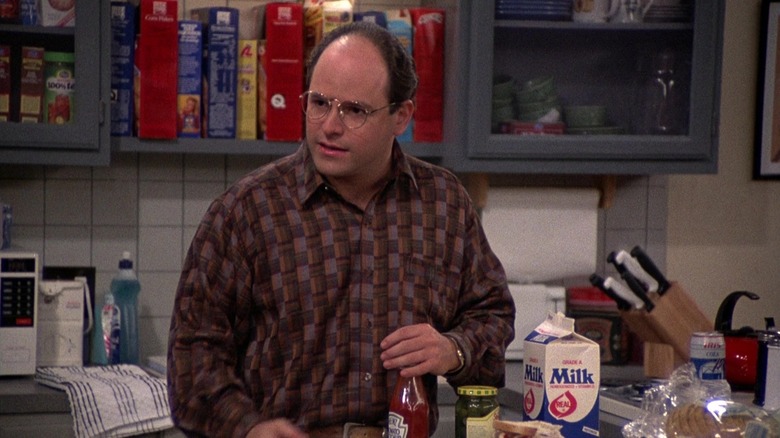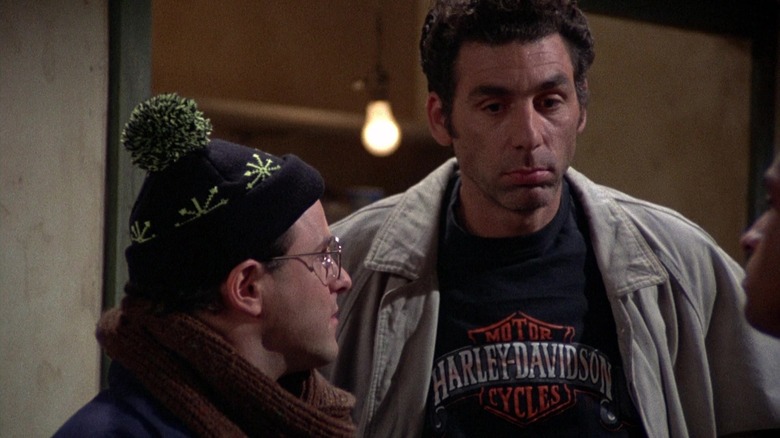The Seinfeld Episode That Completely Changed The Show's Dynamics, According To Its Stars
The most notorious description for Jerry Seinfeld's and Larry David's seminal NBC sitcom "Seinfeld" is that it's "a show about nothing." The showrunners mandated that the series be free of treacly morals or moments of personal growth for the main characters; everyone had to be just as ignorant and petty at the end of an episode as they were at the start. This was seen, at the time, as an antidote to the previous generation's sitcoms, which too often skewed toward morals and sentimentality. "Seinfeld" aimed to be the anti-sitcom.
Of course, "a show about nothing" wasn't quite the pitch when Seinfeld and David first proposed the show to NBC back in 1989. The initial premise (as previously talked about by /Film) was that "Seinfeld" would follow the daily adventures of a stand-up comedian as he traversed modern life in New York, gathering material for his stand-up routines. His many girlfriends would provide him with material, as would his eccentric friends, who are infected with a host of neuroses. And it was at least semi-autobiographical; not only does Seinfeld play a version of himself, but David has made no secrets that the "Seinfeld" character of Cosmo Kramer (Michael Richards) was based on his real-life neighbor Kenny Kramer.
That premise, of course, requires the fictional version of Jerry Seinfeld to have a regular cast of friends to inspire him. Indeed, while the series was named after the central comedian, his three co-stars — Richards, Julia Louis-Dreyfus, and Jason Alexander — were all equally vital to the show. Jerry's experiences may have been the start of the series, but his friends needed to be there for inspiration.
The show's makers agreed that Jerry kind of stopped being the central main character of the show with the airing of "The Busboy" (June 26, 1991). It was in that episode that the writers finally realized they were working on an ensemble show, a phenomenon they talked about on the show's DVD special features.
The Busboy was the first true ensemble piece of Seinfeld
"The Busboy" is about the guilt Elaine (Louis-Dreyfus) and George (Alexander) feel when they make some flippant, non-serious remarks at a restaurant that may have gotten a busboy, Antonio (David Labiosa), fired. George and Kramer try to apologize to Antonio, but they end up breaking his property and letting his cat out. Everything goes poorly for everyone. Antonio eventually finds a new, better job, but even that good fortune is undercut by a fracas involving Elaine and her new boyfriend, who has overstayed his welcome at her apartment. The episode ends with injuries, Antonio losing his new job, and everyone being generally miserable.
On the DVD special features, Louis-Dreyfus noted that something happened on "The Busboy" that she didn't realize until later: the episode wasn't about Jerry. "It was a marked difference from the episodes that preceded it," she said. Producer Glenn Padnick was the one to notice that Jerry was hardly in the script for "The Busboy." Padnick theorized that Seinfeld, who still wrote episodes of the series, had fallen in love with his three co-stars, and was happy to write episodes just for them (David and Seinfeld are the credited writers for the episode).
Padnick wanted to remind Seinfeld that he should be, y'know, the star. Prolific "Seinfeld" director Tom Cherones knew that Seinfeld was a kind co-star who wanted the show to be funny, and wasn't strict about hogging all the laugh lines for himself. Jason Alexander knew the significance of that. "That showed a generosity of spirit that I can't imagine in any other situation. He [Seinfeld] basically gave his co-stars the show."
After "The Busboy," any one of the show's four leads could be at the center of a story. All four actors shared the spotlight equally, and they were all were equally funny. They were all nominated for multiple Emmys.

